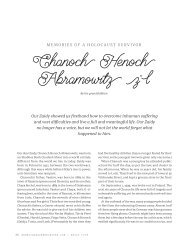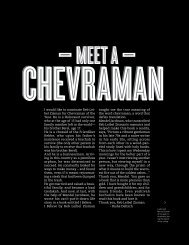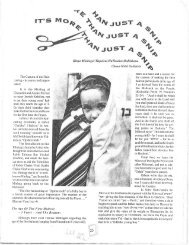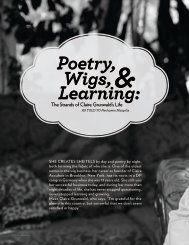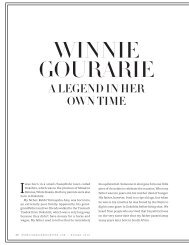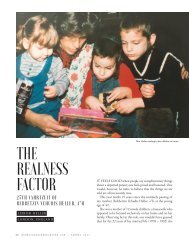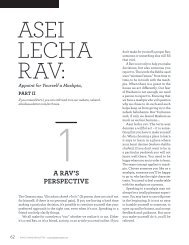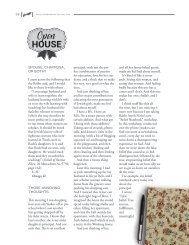You also want an ePaper? Increase the reach of your titles
YUMPU automatically turns print PDFs into web optimized ePapers that Google loves.
our love for this mitzvah.<br />
In addition to all the above, we<br />
have the spiritual dimension. It is<br />
quoted in the name of the Arizal<br />
that one who is careful about a<br />
speck of chometz on Pesach is protected<br />
from sin year-round. Because<br />
chometz represents the yetzer hara<br />
and the ego, we need to work full<br />
force against it (as per Responsa<br />
from the Radbaz). There are only<br />
three other things which the Torah<br />
forbids b’mashehu, even a minute<br />
amount: anger, arrogance and avodah<br />
zarah. Chometz is symbolic<br />
of all of the above. However, here<br />
is a crucial caveat: If being machmir<br />
on Pesach enhances our ego<br />
(engendering a “holier than thou”<br />
attitude toward others who are less<br />
machmir) or leads to anger in the<br />
household, we are defeating the<br />
purpose and allowing our chumros<br />
to become a stumbling block.<br />
out that the rasha in the Haggadah<br />
was referring to the avodah of the<br />
korban Pesach exclusively, whereas<br />
today’s Jews are complaining about<br />
all the extra chumros. Nevertheless,<br />
if we fall into the trap of complaining,<br />
we are defeating the purpose.<br />
DOES THAT MEAN WE SHOULD BE<br />
LESS EXACTING ON OURSELVES?<br />
Not necessarily. Another perspective<br />
on Pesach chumros, from the<br />
Shulchan Aruch (Alter Rebbe<br />
442:30), is that Yisroel kedoshim<br />
heim – the Jews are holy: they<br />
scrape their chairs and walls. Even<br />
though the tasks are not necessary<br />
according to the letter of the law,<br />
the Rishonim tell us – and Shulchan<br />
Aruch quotes this – that the<br />
Jews are considered a holy nation<br />
for performing them. The Shulchan<br />
Aruch adds (O.C. 442:6): Yesh lahem<br />
al mah she’yismochu – they have<br />
If being machmir on Pesach enhances our ego (engendering a<br />
“holier than thou” attitude toward others who are less machmir)<br />
or leads to anger in the household, we are defeating the purpose<br />
and allowing our chumros to become a stumbling block.<br />
Furthermore, Chazal say we are<br />
not permitted even a mashehu of<br />
chometz in a mixture, unlike other<br />
mitzvos where a tiny amount of<br />
the forbidden might be allowed in<br />
a mixture, in some cases, as determined<br />
by a Rav.<br />
One of the reasons for all these<br />
extra safeguards regarding chometz<br />
is due to the fact that chometz is<br />
permitted year-round, unlike traife,<br />
which is always forbidden. The<br />
extra care we take regarding Pesach<br />
serves as a margin of safety as we<br />
separate ourselves from what is<br />
otherwise allowed.<br />
In later times, more Rabbinic<br />
prohibitions were added. Kitniyos<br />
(beans, legumes, rice, etc.) is<br />
an example of food which is not<br />
chometz but which Ashkenazi poskim<br />
have forbidden on Pesach. Of<br />
course, all of Ashkenaz Jewry has<br />
accepted the prohibition of kitniyos<br />
on Pesach, and even some<br />
Sefardim have taken upon themselves<br />
this issur. Even in times of<br />
severe famine, the Tzemach Tzedek<br />
(among other Poskim) treated<br />
kitniyos almost as serious a prohibition<br />
as actual chometz (except<br />
for the infirm or for children). It’s<br />
important to always keep our focus<br />
on the fact that the Jewish people’s<br />
becoming increasingly machmir<br />
through the ages stemmed from<br />
In being machmir on Pesach, people<br />
sometimes violate an explicit<br />
din in Shulchan Aruch (Alter Rebbe<br />
469:5) because they say, “How difficult<br />
this Pesach is for me!” Such an<br />
expression sounds like the words of<br />
the rasha in the Haggadah, “What<br />
is this work to you?” The reality,<br />
however, is that people do feel this<br />
way and therefore they express<br />
it. The Alter Rebbe was melamed<br />
zechus on such people by pointing<br />
a basis to rely upon. This turn of<br />
phrase is generally reserved for discussing<br />
a leniency, since normally<br />
we would not be halachically lenient,<br />
unless there was a real halachic<br />
basis. Why is this expression used<br />
here when discussing a chumra?<br />
The Maadanei Shmuel brings the<br />
following explanation from Reb<br />
Yaakov Yosef of Ostra (and a similar<br />
thought is also found in Mishna<br />
Berurah on this halachah): Here<br />
APRIL 2014<br />
79




